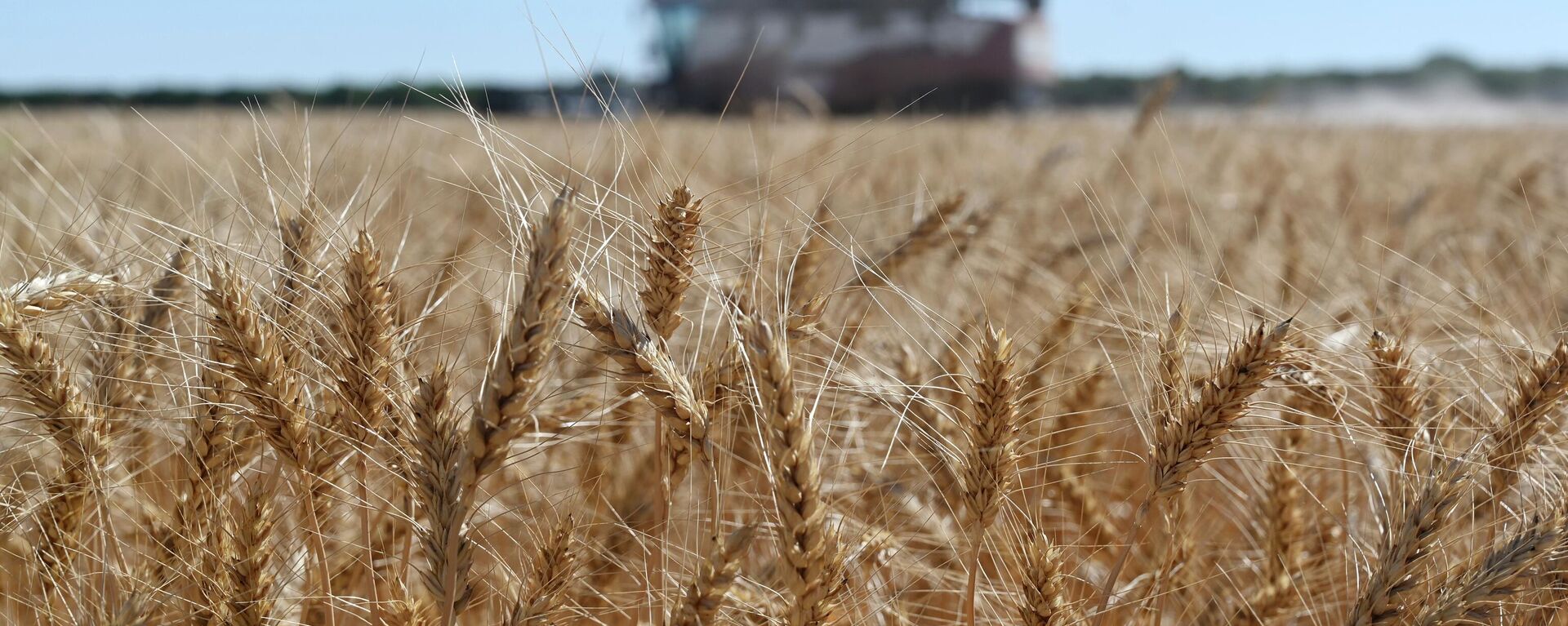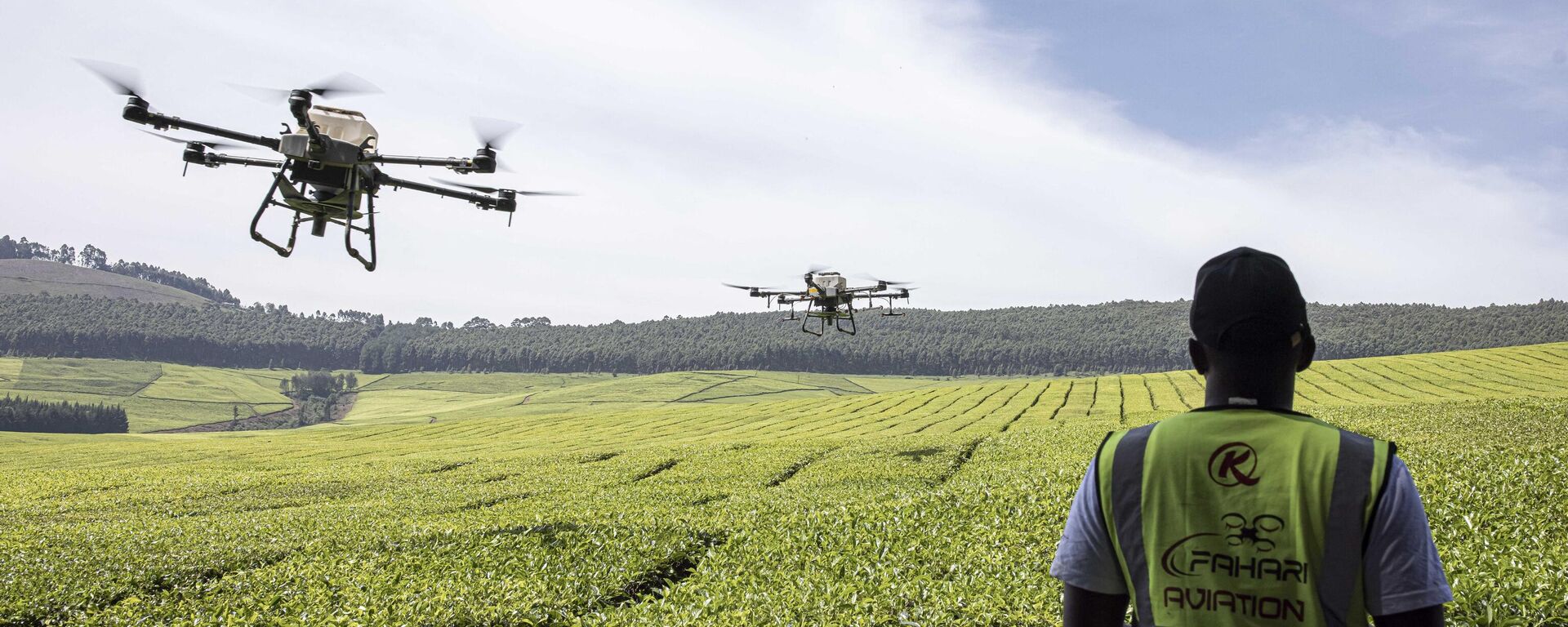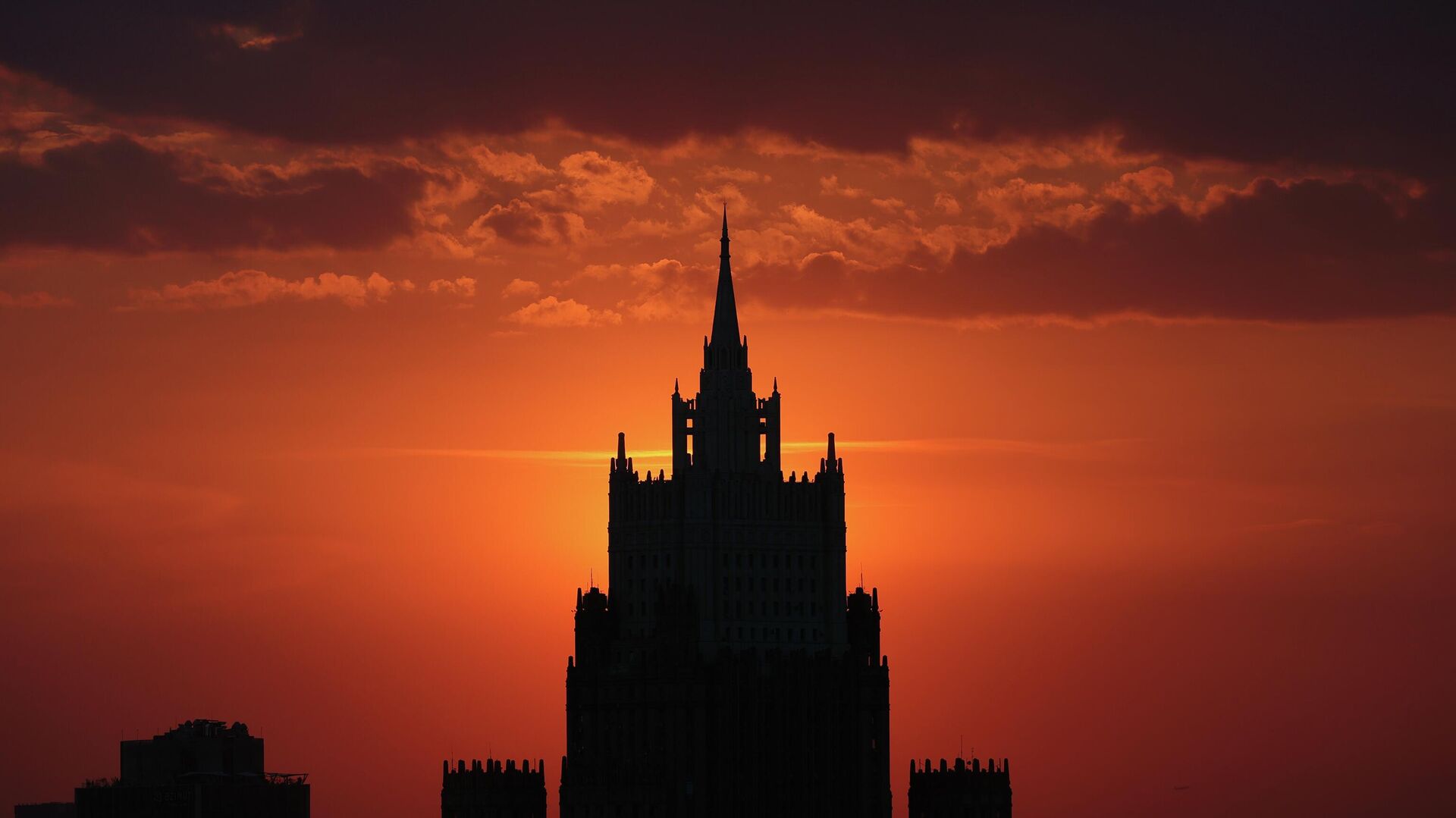https://sputnikglobe.com/20221223/russian-ammonia-supplies-to-needy-nations-blocked-exclusively-by-ukraine-foreign-ministry-says-1105721714.html
Russian Ammonia Supplies to Needy Nations Blocked Exclusively by Ukraine, Foreign Ministry Says
Russian Ammonia Supplies to Needy Nations Blocked Exclusively by Ukraine, Foreign Ministry Says
Sputnik International
Kiev is blocking the resumption of supplies of Russian ammonia, the Russian Foreign Ministry said, noting that Ukraine is the only obstacle to the supply of fertilizers to the countries in need.
2022-12-23T09:28+0000
2022-12-23T09:28+0000
2022-12-23T09:28+0000
africa
russia
fertilizer
russian foreign ministry
maria zakharova
ukraine
ukraine crisis
food
food exports
food blockade
https://cdn1.img.sputnikglobe.com/img/07e6/08/15/1099834947_0:50:3071:1777_1920x0_80_0_0_8c7e0073c0727a14775f3d61af810a0b.jpg
Kiev is blocking supplies of Russian ammonia, Moscow's Foreign Ministry has said, noting that Ukraine is the only obstacle to the supply of fertilizers to countries in need.According to the ministry, similar examples "clearly show" which side in the conflict "not only does not help ensure global food security, but speculates on the needs of the countries of Africa, Asia and Latin America, including in fertilizers, pursuing neo-colonial or narrowly selfish goals."Kiev, however, has claimed that Russia sabotaged the grain deal, despite Ukraine being the country which used the humanitarian corridor for military purposes. The diplomatic body said that it increasingly hears criticism about the insufficiently effective implementation of the agreement, with Kiev blaming Russia, "apparently forgetting that it was Kiev's actions to use the maritime humanitarian corridor for military purposes that led to the temporary suspension of the initiative from October 29 to November 2 and its virtual failure due to the lack of key security guarantees."In this regard, the Foreign Ministry recalled that Russia began to fulfill the terms of the deal in good faith immediately after the signing of the agreements in Istanbul on July 22, . The ministry also recalled that after the expiration of the "Black Sea initiative" for the export of Ukrainian food from the ports of Odessa, Yuzhny and Chernomorsk on November 18, Russia did not object to its extension for another 120 days, until March 18, 2023. The Russian diplomatic body emphasized that there has been no real progress in the implementation of the Russia-UN Memorandum on the normalization of domestic agricultural exports so far."Despite the exemptions for food and fertilizer declared by the West, including Europeans as part of the adoption of the 9th package of anti-Russian sanctions, Russian producers and suppliers continue to face blocking bank payments, prohibitive insurance rates and denial of access to ports," the statement said. "Thus, the matter does not go beyond words and casuistry from Washington, Brussels and London, and in the meantime, countries in need continue to suffer not only from the crisis in the affordability of food and fertilizers but also from their physical shortage."It was also stressed that there are still serious distortions in the implementation of the Black Sea Initiative both in the geography of food recipients and in the range of exported products. Earlier, in an interview with Sputnik, Vladimir Olenchenko, a senior research fellow at the Center for European Studies, Institute of World Economy and International Relations of the Russian Academy of Sciences, said that the West purposefully obstructs fertilizer supplies under the Black Sea grain agreement in an effort to harm Russia's international standing and compel African nations to purchase grain from Europe and the US.Given the serious shortage of fertilizer supplies to needy African countries suffering from a food crisis, Moscow has promised to supply fertilizer to the continent for free.The Black Sea grain deal was reached on July 22 between Russia, Ukraine, Turkey, and the United Nations to create a humanitarian maritime corridor for ships exporting food and fertilizer from Ukrainian Black Sea ports. Vladimir Putin has asserted on numerous occasions that the majority of the ships bringing grain from Ukraine did not arrive in the world's poorest nations but rather ended up in Europe. Putin has also expressed his worries over the failure of Russian goods to reach international markets as promised by the deal.
https://sputnikglobe.com/20221028/russia-sent-about-105mln-tonnes-of-grain-to-asia-and-africa-1102789517.html
https://sputnikglobe.com/20221130/west-detains-fertilizer-supplies-to-africa-on-purpose-pursuing-its-commercial-interests---expert-1104891116.html
africa
russia
ukraine
Sputnik International
feedback@sputniknews.com
+74956456601
MIA „Rossiya Segodnya“
2022
News
en_EN
Sputnik International
feedback@sputniknews.com
+74956456601
MIA „Rossiya Segodnya“
Sputnik International
feedback@sputniknews.com
+74956456601
MIA „Rossiya Segodnya“
black sea deal, ukraine grain deal, grain deal, africa, africa food, food crisis, russian foreign ministry
black sea deal, ukraine grain deal, grain deal, africa, africa food, food crisis, russian foreign ministry
Russian Ammonia Supplies to Needy Nations Blocked Exclusively by Ukraine, Foreign Ministry Says
Kirill Kurevlev
Managing Editor
Exports of Russian food and fertilizers are part of the Black Sea grain deal with Ukraine but are not being carried out. At the same time, the UN has assured that the restrictions would be lifted altogether.
Kiev is blocking supplies of Russian ammonia, Moscow's Foreign Ministry has said, noting that Ukraine is the only obstacle to the supply of fertilizers to countries in need.
"The resumption of ammonia supplies is blocked only and exclusively by Kiev (...) we are talking about seven million tonnes of raw materials per year, sufficient to produce 25 million tonnes of fertilizer to feed 150 million people," the ministry said.
According to the ministry, similar examples "clearly show" which side in the conflict "not only does not help ensure global food security, but speculates on the needs of the countries of Africa, Asia and Latin America, including in fertilizers, pursuing neo-colonial or narrowly selfish goals."
Kiev, however, has claimed that Russia sabotaged the
grain deal, despite Ukraine being the country which used the humanitarian corridor for military purposes. The diplomatic body said that it increasingly hears criticism about the insufficiently effective implementation of the agreement, with Kiev blaming Russia, "apparently forgetting that it was Kiev's actions to use the maritime humanitarian corridor for military purposes that led to the temporary suspension of the initiative from October 29 to November 2 and its virtual failure due to the lack of key security guarantees."
In this regard, the Foreign Ministry recalled that Russia began to fulfill the terms of the deal in good faith immediately after the signing of the agreements in Istanbul on July 22, .

28 October 2022, 07:40 GMT
The ministry also recalled that after the expiration of the "Black Sea initiative" for the export of Ukrainian food from the ports of Odessa, Yuzhny and Chernomorsk on November 18, Russia did not object to its extension for another 120 days, until March 18, 2023.
"We made this difficult decision based on our commitment to our obligations to ensure global food security and in strict linkage with the achievement of real returns from the implementation of the Russia-UN Memorandum on the promotion of domestic agricultural exports, which is the second part of the Istanbul "package," the diplomatic department noted.
The Russian diplomatic body emphasized that there has been no real progress in the implementation of the Russia-UN Memorandum on the normalization of domestic agricultural exports so far.
"Despite the exemptions for food and fertilizer declared by the West, including Europeans as part of the adoption of the 9th package of anti-Russian sanctions, Russian producers and suppliers continue to face blocking bank payments, prohibitive insurance rates and denial of access to ports," the statement said. "Thus, the matter does not go beyond words and casuistry from Washington, Brussels and London, and in the meantime, countries in need continue to suffer not only from the crisis in the affordability of food and fertilizers but also from their physical shortage." It was also stressed that there are still serious distortions in the implementation of the Black Sea Initiative both in the geography of food recipients and in the range of exported products.
“Despite its declared humanitarian nature, cargoes are sent mainly to countries with a high level of income, while poor states receive no more than 3%. At the same time, 70% of the cargoes are fodder corn and feed grains that the needy, they say, can buy food at lower prices," the ministry said.
Earlier, in an interview with Sputnik, Vladimir Olenchenko, a senior research fellow at the Center for European Studies, Institute of World Economy and International Relations of the Russian Academy of Sciences, said that the West purposefully obstructs fertilizer supplies under the Black Sea grain agreement in an effort to harm Russia's international standing and compel African nations to purchase grain from Europe and the US.
Given the serious shortage of fertilizer supplies to needy African countries suffering from a food crisis, Moscow
has promised to supply fertilizer to the continent for free.

30 November 2022, 16:56 GMT
The Black Sea grain deal was reached on July 22 between Russia, Ukraine, Turkey, and the United Nations to create a humanitarian maritime corridor for ships
exporting food and fertilizer from Ukrainian Black Sea ports. Vladimir Putin has asserted on numerous occasions that the majority of the ships bringing grain from Ukraine did not arrive in the world's poorest nations but rather ended up in Europe. Putin has also expressed his worries over the failure of Russian goods to reach international markets as promised by the deal.




